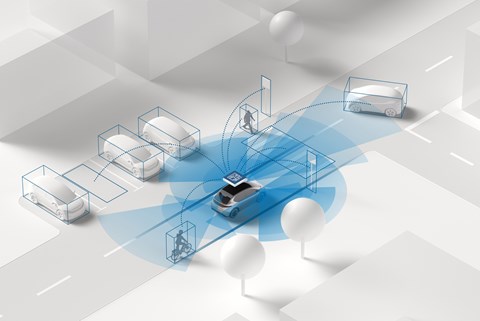► Bosch’s mobility head talks to CAR
► How does the brand move on from Dieselgate?
► Semiconductors, safety software and
If you drive a car, chances are it uses at least one component from Bosch. The company is a giant in the automotive world, developing everything from fuel injectors and spark plugs to sensors, brake components, batteries and even wiper blades – and much more besides.
But the automotive landscape is changing, and so is Bosch. After its involvement with Dieselgate, for which it was heavily fined, the German company says it ‘has taken further steps to considerably improve its already existing compliance policies and procedures.’ Bosch says it is now ‘looking ahead, focusing our attention and resources on shaping the future in our areas of business.’
As that future will involve fewer engines and more EVs, the company is becoming increasingly involved in software and digital technologies.
The person at the epicentre of Bosch’s automotive transformation is Dr Markus Heyn, chairman of Bosch’s Mobility division, and a member of Bosch’s management board. He’s lived and breathed cars since his university days at the tech-centric RWTH Aachen, including a stint as a researcher at Ford before joining Bosch in 1999.
‘The acceleration of certain trends, and the impact that these trends have on our offerings, led us to the conclusion that we needed to really focus on them,’ says Heyn. ‘It’s a huge change – so much so that it will affect almost all of the 250,000 people here at Bosch, but we’re making good progress.’
Bosch’s exhibits at the recent Consumer Electronics Show in Las Vegas and the 2023 IAA Mobility show in Munich gave an insight into its current priorities: lidar sensors, software for connected mobility and interior comfort technologies.
Heyn prizes Bosch’s reputation as a company that creates reliable components that can do the job, and assures us it will still be the case in the digital universe.
‘We’re a brand that is trusted and a brand that can deliver high quality,’ he says. ‘Every year we win awards for our products. The good news is that our heritage brings tremendous safety and security which, for automotive, is absolutely important. It’s different here than it is making smartphones, for example. And while our heritage has always been mechatronic systems with software embedded in it, we’re now building more of a pure software business.’
The size and diversity of the company in some ways helps Bosch to pivot quickly and commit to its new strategy wholeheartedly: ‘We have 38,000 software specialists and developers – that’s massive! Even if you go beyond all of the automotive players, it’s a tremendous workforce that will help us to catch up to the train of digitisation,’ says Heyn.

As well as developing and refining proprietary software and componentry, Bosch is aiming to become a bigger player in semiconductors – a component rapidly growing in importance in the modern car. ‘On average, the electronic content of a vehicle is about 10 per cent higher year on year, so even if the magnitude of produced cars would stagnate, the electronic content would still rise significantly.’
Heyn points out that Bosch has had skin in the semiconductor game for years but admits some potential was untapped. ‘We primarily focused on making them for divisions inside the company, but we’ve opened it up to the external market.’
And now it’s pouring billions of euros into that part of its business. It opened a chip factory in Dresden in 2021, and last year acquired US-based TSI Semiconductors and opened a chip testing facility in Malaysia.
‘We really need to focus on this critical technology in order to prevent a second wave where the automotive industry could be strangled again [like it had been initially post-pandemic] because there simply isn’t enough capacity. The hard part is that growing electronic content of a car – we need to now focus on that core technology to avoid any more deadlocks in the future.’
The CAR Curveballs: six questions only we would ask
Tell us about your first car…
‘A Golf, a blue one – I had a little help from my parents to buy it. I was very happy with that car.’
What achievement makes you most proud?
‘Having the guts to rebuild this company with new perspectives on hardware, software and semiconductors. I think it’s a bold move considering we’re such a big company.’
What was the best thing you’ve ever done in a car?
‘I used to race around on small back roads on private land with friends when I was much younger. I regularly used to drive my mother’s car, which was green but usually came back brown after I was finished with it. She didn’t know about it for a long time!’
Tell us a time when you’ve really screwed up…
‘My first winter testing in Sweden. I learned you couldn’t beat physics, and landed an AMG GT in the snow and couldn’t get it back out.’
Supercar or classic?
‘Supercar, mainly because I attend two or three motorsport events a year and see so many.’
Company curveball: what was the first automotive component Bosch made?
‘It was the magneto ignition cylinder!’ [Heyn is correct.]